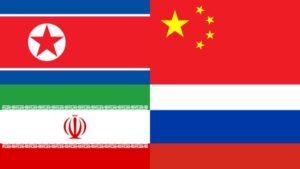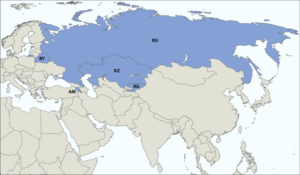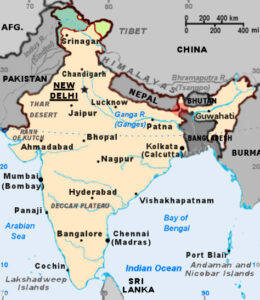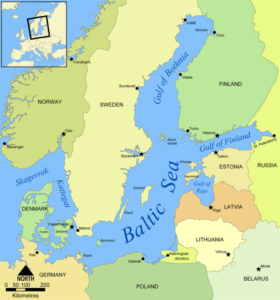- China’s emergence as a global economic power has been one of the main drivers of Economic Nationalism;
- With China as a competitor, major world powers feel the need to protect their interests and preserve their competitiveness by partly copying the Chinese model;
- Economic Nationalism is emerging as a predominant approach by major world powers as a geopolitical weapon.
In recent years, we have seen a significant shift in the economic approach adopted by major world powers, as economic nationalism gains ground at the expense of neoliberalism.
This shift is driven by a combination of factors, including China’s impressive economic growth, the impacts of the COVID-19 pandemic, and geopolitical tensions such as the Ukraine crisis.
These events have led countries to rethink their economic policies and adopt a more protectionist stance in relation to their national interests.

The difference between Economic Nationalism (Industrial Policy) and Neoliberalism (Washington Consensus)
Economic nationalism, also known as Industrial Policy, and Neoliberalism, represented by the “Washington Consensus“, are two different approaches to economic policy. These approaches have different perspectives on the role of the state in the economy and different objectives in relation to economic development.
Economic nationalism is an approach that emphasizes more active state intervention in the economy. Proponents of this approach believe that the state should play an important role in promoting economic growth and protecting national interests.
They defend the implementation of policies aimed at strengthening specific sectors of the economy, through subsidies, import tariffs, tax incentives, public investments and other measures. The objective is to create favorable conditions for the development of national industries, promote competitiveness and reduce external dependence.
On the other hand, Neoliberalism, represented by the “Washington Consensus”, is an approach that emphasizes economic liberalization, deregulation and the reduction of the State’s role in the economy. This approach was widely promoted in the 1980s and 1990s as a model of economic reform for developing countries.
Advocates of neoliberalism believe that state intervention in the economy can lead to inefficiencies and distortions, and advocate open markets, free competition, protection of property rights, and minimization of government controls. The aim is to stimulate economic growth through efficient allocation of resources and increased international competitiveness, but with little emphasis on national security and geopolitical issues.
How China, the Pandemic and the War in Ukraine Are Driving Countries to Adopt More Economic Nationalism
As has been seen, the world is undergoing a significant transformation in the economic and geopolitical arena. China’s rise as an economic power, coupled with the impacts of the COVID-19 pandemic and the conflicts in Ukraine, are pushing many countries to adopt more nationalistic approaches to their economic policies.
This move towards economic protectionism reflects a response to a range of factors and challenges faced by nations around the world.
One of the main drivers of economic nationalism is the concept of “decoupling”. Trade and geopolitical tensions between the United States and China have encouraged several countries to reduce their economic dependence on other nations. This maneuver aims to protect its own national interests and minimize the risks associated with close trade ties and the economic interdependence of countries considered strategic rivals such as China.
It is important to note that countries such as the United States and members of the European Union have adopted certain elements of Chinese industrial policy in their own economic reforms, to combat China’s own rise.
These global actors recognized that Beijing’s economic strategy is widely used for geopolitical purposes, putting the national interest above all else, to the detriment of the market, favoring not only its economic objectives, but also its political interests.
In this context, “reshoring” (bringing production back to the country of origin) and “nearshoring” (transferring production to geographically close countries) have become strategies increasingly adopted by both the US and European Union countries.
Many States have realized the risks and vulnerabilities associated with excessive concentration of production in other countries and are seeking to strengthen their domestic economies. This change aims to create local jobs, secure supplies of essential goods and reduce reliance on extensive and complex global supply chains.
Another important aspect of economic nationalism is “derisking”, which involves minimizing economic and financial risks. Countries are seeking to diversify their supply sources in strategic sectors to ensure national security.
By reducing reliance on a single vendor or market, they seek to mitigate the risks associated with business disruptions, resource shortages and geopolitical vulnerabilities.
Other important reasons for this move towards economic nationalism were the COVID-19 pandemic and the war in Ukraine, as these events exposed the vulnerabilities of global supply chains, disruptions to international trade and over-reliance on a single supplier or market.
The pandemic has revealed the importance of having internal productive capacities to guarantee the supply of essential goods, such as medical supplies and protective equipment.
In addition, the war in Ukraine and geopolitical tensions around the world have led countries to reassess their security and sovereignty policies. This includes protecting strategic sectors such as energy, technology and food by strengthening domestic production and diversifying sources of supply.
This concern extends to areas such as technology, energy, food and natural resources, where excessive dependence on other countries can compromise defense capacity and sovereignty.
In this way, economic nationalism is leading many countries to reassess their industrial policies and adopt measures to strengthen sectors considered strategic for their economic development and national security.
As a consequence, this movement may eventually involve investments in research and development, subsidies and specific support policies to promote the competitiveness of these sectors.
Globalization vs Slowglobalization Deglobalization
Globalization has been a major theme in recent decades, characterized by increased interconnection and interdependence between countries, driven by free trade, capital flow and economic integration.
However, recently, there has been a movement towards “slowglobalization” or even “desglobalization”, which closely resembles the movement towards rising economic nationalism.
These trends also reflect a growing emphasis on protecting national interests, reducing external dependency, and seeking greater control over the domestic economy.
For a more comprehensive view of the current situation, it is important to analyze the industrial policies of the great powers and emerging countries. So here are some examples:
- China: Beijing implemented the “Made in China 2025” strategy, which seeks to advance high-tech sectors and strengthen domestic industry. It is important to emphasize that China has never adopted a neoliberal approach, but rather a state economy, with strong government intervention in the economy.
- United States: Washington has adopted industrial policies to promote innovation and competitiveness, such as the IRA (Incentives for Research and Development in America) and the Chips Act (Creating Helpful Incentives to Produce Semiconductors). Additionally, they are focused on driving sustainable energy and electric mobility (EV) as part of their efforts to achieve environmental goals and reduce dependence on fossil fuels.
- European Union: the bloc adopted measures to strengthen control over the domestic economy, including the implementation of foreign investment intervention policies, export controls and foreign investment review. In addition, restrictions are being proposed on the outsourcing of advanced technologies to autocracies in order to protect intellectual property and national security, reflecting a trend towards greater economic protectionism and state control in the region.
countries like France have a history of dirigisme, that is, state intervention in the economy to promote strategic sectors. - Japan: Tokyo has a tradition of mercantilism, with policies aimed at strengthening domestic industry and promoting exports.
- South Korea: The country has adopted a similar approach to mercantilism as well to boost its economic growth.
- Australia: Sydney has adopted industrial policies to promote key sectors such as natural resources, energy and agriculture. The country seeks to maximize the added value of its natural resources, encouraging innovation and the development of advanced technologies in the mining and energy industry. In addition, Australia has implemented measures to protect its national interests, such as restrictions on foreign acquisitions of companies in strategic sectors and the promotion of local content in investment projects.
- India: New Delhi has been looking to strengthen its key sectors such as information technology, manufacturing, renewable energy and agriculture. The Indian government has launched programs such as “Make in India” and “Digital India”, which aim to attract foreign direct investment and promote the development of high value-added industries. In addition, India has implemented protective policies such as import tariffs and non-tariff barriers to protect domestic sectors from foreign competition.
- Chile: Santiago, specifically in the lithium sector, is seeking greater state control over the production and export of the mineral, establishing restrictions on the entry of foreign investors and aiming to increase its participation in the value chain. This approach reflects a greater concern with economic sovereignty and the maximization of local benefits.
- Turkey: Ankara has implemented industrial policies to promote key sectors such as manufacturing, automotive, textiles and energy. The country has sought to attract foreign investment, promote innovation and technological modernization in its industries. Furthermore, Turkey has adopted measures to protect its national interests, such as restrictions on the import of certain products, support for exports and promotion of local content in investment projects.
It is important to highlight that industrial policies can vary in terms of approach and intensity, depending on the characteristics and objectives of each country.
Why Economic Nationalism Can Be Dangerous and Isn’t for Everyone
Economic nationalism often comes at a high financial cost, requiring large public investments to protect and promote key sectors of the economy. These policies aim to strengthen the domestic economy, but can result in an increase in public debt if poorly managed, which puts the country’s financial health at risk.
Furthermore, economic nationalism can lead to inflation. By protecting key sectors of the economy and restricting external competition, domestic prices can be artificially high. This can result in inflationary pressures, especially if monetary and fiscal policies are not properly managed.
Inflation undermines the purchasing power of consumers, reduces the competitiveness of companies and creates uncertainty in financial markets. A high inflation environment can negatively affect investment, job creation and sustainable economic growth.
For these reasons, it is important to highlight that industrial policy may not be suitable for all countries. Economic characteristics, industrial structures and levels of development vary from one nation to another.
The importance of the growth of Economic Nationalism in world geopolitics
The rise of economic nationalism has had a significant impact on world geopolitics, especially in the current context of changes in global economic relations.
With that in mind, some of the main points to consider are:
- Impact on emerging economies: Emerging countries have been some of the biggest beneficiaries of globalization as they have been able to take advantage of global trade and investment opportunities via Foreign Direct Investment (FDI). However, the emergence of industrial policy, with protectionist measures adopted by the great powers, can negatively affect these economies. Trade restrictions, tariffs and non-tariff barriers can limit these countries’ access to international markets and hinder their economic growth.
- Reaction and search for resilience: Faced with economic protectionism, emerging countries need to react and protect their economic interests. Those with the capacity to invest efficiently in the national industry have the opportunity to become winners in this new scenario. This may involve stimulating strategic sectors, developing industrial policies, promoting innovation and technology, among other strategies to boost competitiveness and promote a more resilient national economy.
- Shift in the balance of power: The rise of economic protectionism may have the potential to shift the balance of power in world geopolitics. Great powers that adopt a more protectionist approach may seek to reduce their economic dependence on other countries – including emerging countries – and strengthen their position on the global stage. If successful, the great powers can become even stronger to the detriment of countries that fail to adapt to deglobalization. At the same time, this could create opportunities for other emerging countries to gain greater influence and economic power through nearshoring such as Mexico (relative to the US) and Turkey (relative to Europe). This can result in geopolitical realignments and shifts in international alliances.
However, it is important to recognize that the growth of economic nationalism is not uniform across all major powers, and emerging country responses also vary.
In addition, economic and political relations between countries are influenced by a number of factors, such as strategic interests, alliances, national security, political and economic values.
However, this growth has the potential to alter world geopolitics, affecting emerging economies and major powers and potentially shifting the balance of power.



















[…] With a past marked by political transformations and international alliances, Türkiye has played a significant role in the global balance of power, especially in relation to its participation in the North Atlantic Treaty Organization (NATO) and, more recently, its relations with Ukraine. […]
[…] as a dominant economic ideology in recent decades, preaches the minimization of state intervention in the economy and the promotion of free […]
[…] further said that “There is an axis of evil in the world: China, Russia, North Korea and Iran” and that “we need to confront the axis of evil, not try to do […]
[…] the initial of the name of each of the group’s countries, being Brazil, Russia, India, China and South Africa. They are considered emerging countries in a developing situation, with the HDI […]